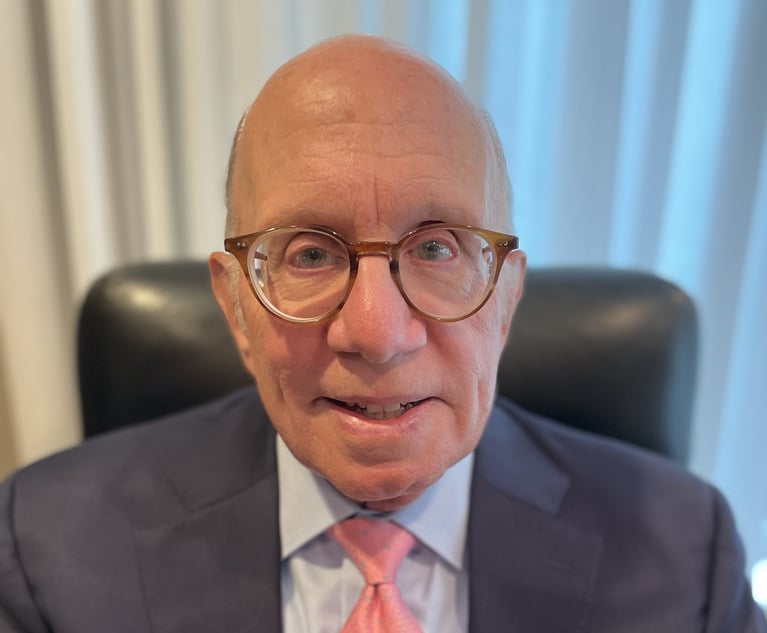 Special Counsel Robert Mueller III
Special Counsel Robert Mueller IIIWhat If Mueller Hadn't Been Appointed?
Where would the body politic be now regarding the president's conduct? We would likely be nowhere.
July 30, 2019 at 12:05 PM
5 minute read
The dust has begun to settle. The verdict is decidedly mixed.
Yes, in some respects, special counsel Mueller's report reads like a Russian novel, albeit, oddly, filled with double negatives. Nonetheless, Mueller and his report have held the day for those who want Trump exiled to history's dustbin. However, particularly given Mueller's (some might say) doddering testimony, the “Forever-Trumpers” have held the night. And so, the dark may ultimately rule the light. We won't know for sure until late one chilly Tuesday night in November 2020.
A more articulate, forceful and willing testimony by Mueller could have changed all that, and maybe allowed or even forced the Trumpers (or the mostly Trumpers) to see more light—but it is what it is. We probably won't know for a while precisely “what happened with Mueller.” And maybe because something obviously did, the individual citizen's going-in partisanship will largely determine how he or she judges the president's conduct as presented by the report—“exonerated” or not. The needle simply will not have been moved one centimeter.
But what if Mueller hadn't been appointed? What if, after Attorney General Sessions had recused himself, Deputy Attorney General Rosenstein decided to keep the investigation of Russian interference inside the Justice Department? Suppose he had chosen a ramrod straight, Mueller-like, career prosecutor within the Justice Department—let's call him, James Straight—to command the investigation with a team of career and dedicated Justice Department attorneys who had held their positions long before Trump and were only dedicated to defending the “presidency”, not this president? Same number of witnesses, search warrants, indictments. Suppose Acting Attorney General Rosenstein retained ultimate decision-making authority, but didn't interfere one iota in Straight's investigation as, incidentally, was clearly the case with Mueller.
Now, theoretically at least, Trump and his base shouldn't have a problem with that—even though surely they would have. It would have been deemed a “witch hunt” even if the likes of Mickey Mouse were assigned to conduct the investigation. And, most important, in this hypothetical, at the end of the day, assuming the investigation's total bona fides, the president would have been exonerated on the Russian conspiracy or so-called collusion. And aside from the obstruction issue as it relates to Trump's intent to fire Mueller, we can assume the obstruction final determinations by Straight would have been the same; a Justice Department prosecutor can't indict a sitting president.
But, here's the thing. There would have been no detailed report, however the public might choose to read it. Justice Department prosecutors who decline to indict someone don't write reports. Yes, they may explain to their superiors within the Department, sometimes in extraordinary detail, why they declined prosecution. And, in some limited circumstances, when they are responsible for the investigation having been made public, they write a letter to the target saying something like “there was insufficient credible evidence to sustain an indictment against you.” But no report—either up or down. And nothing like FBI Director James Comey did with Hillary Clinton—there would have been no public statement that there was no indictable offense, notwithstanding a very public excoriation of her conduct. In short, the facts, and as described in the report the facts are largely undisputed by the White House, would never have seen the cool light of day except occasionally through anonymous source reportage. Would that have been preferable for anyone?
In short, had Mueller never existed as special counsel and our man Straight had investigated the president with the same robustness and in precisely the same way as did Mueller, where would the body politic be now regarding the president's conduct? We would likely be nowhere. The president would have been investigated in the same way as is John Q. Citizen, and with the same integrity as John Q. Citizen is typically investigated.
Except this: Aside from the Trumpers, no one would believe that “truth and justice” had prevailed or gotten a fair shake. No citizen from the opposite end of the political spectrum would have believed for a single moment that Trump hadn't put his finger on the scales—given that James Straight, consummately straight as he might have been, was basically a Trump employee at Main Justice. Especially when Trump's Attorney General William Barr, would later make the ultimate decision to decline prosecution. If half the citizenry were to conclude that the result had no credibility that would mean that result had no credibility.
Mueller, as it turns out, and for whatever reason, was hardly a paradigm of what one might have wanted in a special counsel asked to articulate his findings. Indeed, Mueller was simply immovable in his unwillingness to say, in print or orally (even though it appeared to slip out once accidentally when he testified), that if Trump were a private citizen he would have been indicted. The problem with Mueller is that he simply wasn't able to go for the gusto, when “gusto” is exactly what many believe was needed.
Still, at least now with Mueller, the public—at least the public willing to read for itself—knows exactly what Trump did and did not do, however tongue-tied the voice of the report turned out to be when he appeared before the Congress.
Joel Cohen practices white-collar criminal defense law at Stroock & Stroock & Lavan. He is an adjunct professor at Fordham Law School.
NOT FOR REPRINT
© 2024 ALM Global, LLC, All Rights Reserved. Request academic re-use from www.copyright.com. All other uses, submit a request to [email protected]. For more information visit Asset & Logo Licensing.
You Might Like
View All
Patent Trolls Come Under Increasing Fire in Federal Courts

Why Is It Becoming More Difficult for Businesses to Mandate Arbitration of Employment Disputes?
6 minute readTrending Stories
- 1Cars Reach Record Fuel Economy but Largely Fail to Meet Biden's EPA Standard, Agency Says
- 2How Cybercriminals Exploit Law Firms’ Holiday Vulnerabilities
- 3DOJ Asks 5th Circuit to Publish Opinion Upholding Gun Ban for Felon
- 4GEO Group Sued Over 2 Wrongful Deaths
- 5Revenue Up at Homegrown Texas Firms Through Q3, Though Demand Slipped Slightly
Who Got The Work
Michael G. Bongiorno, Andrew Scott Dulberg and Elizabeth E. Driscoll from Wilmer Cutler Pickering Hale and Dorr have stepped in to represent Symbotic Inc., an A.I.-enabled technology platform that focuses on increasing supply chain efficiency, and other defendants in a pending shareholder derivative lawsuit. The case, filed Oct. 2 in Massachusetts District Court by the Brown Law Firm on behalf of Stephen Austen, accuses certain officers and directors of misleading investors in regard to Symbotic's potential for margin growth by failing to disclose that the company was not equipped to timely deploy its systems or manage expenses through project delays. The case, assigned to U.S. District Judge Nathaniel M. Gorton, is 1:24-cv-12522, Austen v. Cohen et al.
Who Got The Work
Edmund Polubinski and Marie Killmond of Davis Polk & Wardwell have entered appearances for data platform software development company MongoDB and other defendants in a pending shareholder derivative lawsuit. The action, filed Oct. 7 in New York Southern District Court by the Brown Law Firm, accuses the company's directors and/or officers of falsely expressing confidence in the company’s restructuring of its sales incentive plan and downplaying the severity of decreases in its upfront commitments. The case is 1:24-cv-07594, Roy v. Ittycheria et al.
Who Got The Work
Amy O. Bruchs and Kurt F. Ellison of Michael Best & Friedrich have entered appearances for Epic Systems Corp. in a pending employment discrimination lawsuit. The suit was filed Sept. 7 in Wisconsin Western District Court by Levine Eisberner LLC and Siri & Glimstad on behalf of a project manager who claims that he was wrongfully terminated after applying for a religious exemption to the defendant's COVID-19 vaccine mandate. The case, assigned to U.S. Magistrate Judge Anita Marie Boor, is 3:24-cv-00630, Secker, Nathan v. Epic Systems Corporation.
Who Got The Work
David X. Sullivan, Thomas J. Finn and Gregory A. Hall from McCarter & English have entered appearances for Sunrun Installation Services in a pending civil rights lawsuit. The complaint was filed Sept. 4 in Connecticut District Court by attorney Robert M. Berke on behalf of former employee George Edward Steins, who was arrested and charged with employing an unregistered home improvement salesperson. The complaint alleges that had Sunrun informed the Connecticut Department of Consumer Protection that the plaintiff's employment had ended in 2017 and that he no longer held Sunrun's home improvement contractor license, he would not have been hit with charges, which were dismissed in May 2024. The case, assigned to U.S. District Judge Jeffrey A. Meyer, is 3:24-cv-01423, Steins v. Sunrun, Inc. et al.
Who Got The Work
Greenberg Traurig shareholder Joshua L. Raskin has entered an appearance for boohoo.com UK Ltd. in a pending patent infringement lawsuit. The suit, filed Sept. 3 in Texas Eastern District Court by Rozier Hardt McDonough on behalf of Alto Dynamics, asserts five patents related to an online shopping platform. The case, assigned to U.S. District Judge Rodney Gilstrap, is 2:24-cv-00719, Alto Dynamics, LLC v. boohoo.com UK Limited.
Featured Firms
Law Offices of Gary Martin Hays & Associates, P.C.
(470) 294-1674
Law Offices of Mark E. Salomone
(857) 444-6468
Smith & Hassler
(713) 739-1250








